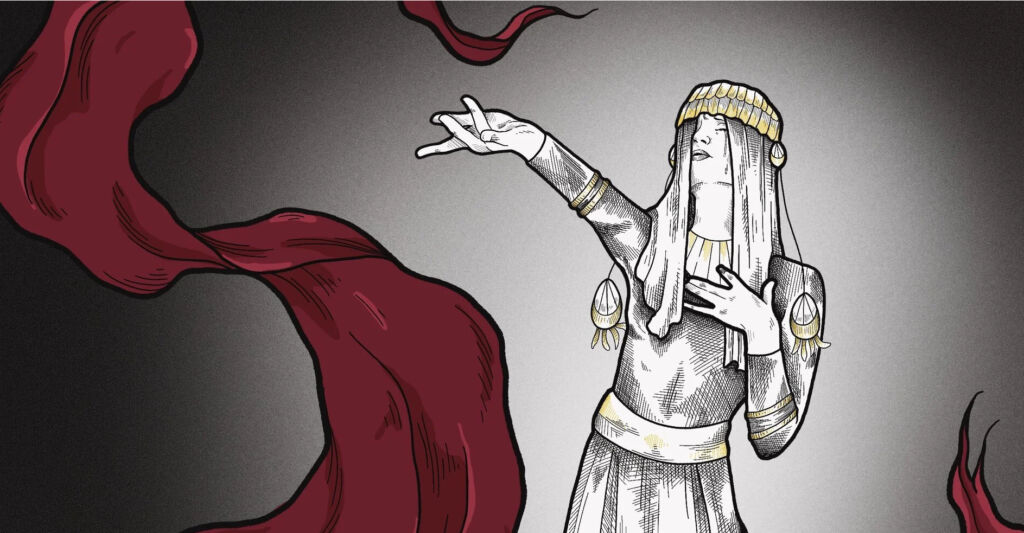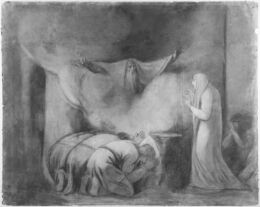“Few Out of Many Returned”: Theaters of Naval Disaster in Ancient Athens, Part 2
Posted By Kathryn S. On In North American New Right | 3 Comments2,609 words
Part 2 of 4 (Part 1 here [2])
The Play
Written nearly ten years after its subject events, Aeschylus’ drama The Persians was revolutionary, since its Athenian author[1] [3] told the story from the enemy’s point of view; still, the sensibility was Greek. The “dialogue” itself, on which all drama is based, emerged from the Greek conviction that men could find truth through persuasive argument; that dilemmas could be, if not resolved, then clarified before an audience of free-minded people. The theater, like the trireme, was thus another manifestation of Athenian citizenship. In this first of Western plays, Aeschylus asked his listeners to put themselves in the places of Persian civilians as they watched
the tumult of a seemingly invincible army going by, hour after clamorous hour. It was like “standing on the bank of a mighty river at high flood as it plummet[ed] past, rolling debris and uprooted trees, roaring . . . there was never such an awesome parade of power as that congregated [in Persia] and unleashed against [their European] enemies.”[2] [4] Then . . . silence.
Asia was a land of ghosts and whistling wind, “a beach left bereft as a great wave slides back to sea . . . sand sizzle[d] and murmur[ed] with absence wiped clean after the pounding water has pulled itself away.” All day, the fare-wellers had watched as “the host of [their] empire’s power passed triumphal before [them].” Only the elderly, women, and children remained “behind in this place, now emptied of young men . . . the hollow shell of a vacant city[3] [5].” Silent anxiousness made their eyes dart all ‘round for omens. Every wife or daughter looked up from her tasks again and again, “she [couldn’t] help it . . . she [knew] she [wouldn’t] see him there . . . [but] she [felt] haunted by the details” that she now clung to even as the weeks and months bleached his image from her mind. “Every person she [saw] who [was] not him wrenche[d] her with its wrongness . . . she [knew] he [wouldn’t] come into view. It [was] impossible.” Even the war-hawk Chorus seemed to be second-guessing themselves, they, “the ones who [had] pointed west and told [the young men] to go . . . and seek conquest.” At present, these wise councilors complained, “We spend our days, restless, waiting for news, any news, of what has become of the [armies] we sent to war . . . [but] there is nothing, only the humming waste of beyond.”[4] [6]
One of the features that stood out in ancient Greek dramas, and pre-modern life in general, was the Wait. I capitalize it, because it was a terrible kind of wait/weight that we moderns would find almost impossible to imagine. Read ancient texts, and you invariably meet women waiting for their men to come home from work, war, sea voyages, or epic quests. They wait for months, years — decades. Even Persian royals, those who had direct communication lines to the gods and the entire world at their bejeweled fingertips, had to wait a minor eon for news from abroad. In ideal conditions, reports took nine months to travel from Greek Attica to Achaemenid Bactria. Less dramatic waits were also constant realities that could spread the potentially dangerous epidemic of restlessness. Second thoughts, rumors, and paranoia could swirl, while voices demanding, “Do something!” swelled in pitch and frequency. The Wait was made all the more intolerable by short, but magnificent bursts of action that preceded it. In a day of unparalleled fanfare, a thousand ships set sail for foreign shores. Two, or three hundred thousand armored men paraded through the capital while on their glorious march to the front. And then . . . silence. This launch and stasis fueled great Greek conflicts on and off the stage. A peculiar psychology took hold, one that believed in choice, that human action could affect outcomes (we should do something!); and one that succumbed to a fatalism of no-choice (we can do nothing but wait).
 [7]
[7]You can buy Jonathan Bowden’s collection The Cultured Thug here [8].
In The Persians, Queen Atossa (Xerxes’ mother and the wife of the deceased Darius) was not immune to the Wait. Given the palatial expanse of her residence, the emptiness seemed even more oppressive. “I am haunted by my own useless importance,” she confessed, for “there is not enough of me for so much grandeur.” Sleep brought no respite, for even her dreams were haunted. Sometime in the night she’d startled awake from a vision. Two birds — an eagle and a hawk — battled for supremacy of the skies. The great Persian eagle “was pursued by a dark falcon, talons spread, screaming vengeance . . . the two of them fell in a spiral.” The falcon ripped the eagle’s head apart in a “bloody fury.” Her description caused the Chorus of Elders to scramble for explanations and reassurances to soothe her worst fears, while they furtively looked at one another and saw the same dread reflected in every face. The Great Wait had begun to exact its great toll; was slowly losing them the war for morale. While the troops were out “Pursuing old men’s dreams,” the old men themselves had “nothing . . . to do. And we must do something,” they thought desperately. “Action, any action, [was] better than this fruitless worry and wringing of hands.”[5] [9]
This was the dynamic of stasis and the yearning for meta-stasis, the Great Wait grinding all patience down to naked nerve endings, until the left-behind prayed for something, even if it was terrible, to happen. Every rumor, good or bad, they savored as if it were the last cool drop of rain within a thousand miles of chapped wilderness. It was during this stage of war on the home front that the strangest incidents occurred. People hallucinated and heard voices; statues wept tears of blood; roosters transformed into hens; women gave birth to three-headed monsters. In the ancient world the stress was magnified, given its peoples’ belief in destiny — that the gods had already decreed the outcome of war. For the Greeks especially, this was paired with a similarly strong belief in human choice and self-determination. The Greeks were free men — captains of the seas who sailed where they wished. And in Aeschylus’ play, the Persians presumed that they were just as blessed. Even as they grew more and more worried, in their hearts they could not conceive of any result, save victory. No, they repeated:
Defeat is impossible.
Defeat is unthinkable.
We have always been the favorites of Fate.
Fortune has cupped us in her golden palms,
It is only a matter of choosing our desire,
Which fruit to pick from the nodding tree.[6] [10]
Aeschylus resolved the paradox between human action and Divine Will by having his Persian characters assume that they enjoyed unlimited choice, because only one outcome was possible: the outcome of success at anything they might attempt, for they were beloved of Heaven. Their “fate was to rule.”
Suddenly, the Persians heard a herald riding up to the city. Even at a distance, the pounding hooves sounded like thunderclaps. The Great Wait had broken! Here was the advance guard of Xerxes’ triumphant army, come to tell the capital to begin preparing the great feasts and parades for the King’s return. Praise be to the One, that they had lived to see this day!
“What news? What news?”
The Herald, who had left with Xerxes’ army scarcely out of boyhood, now had the careworn face of middle age. “O Persia! I am come to break you. All is lost.” Out of so much youth that left here in rank upon rank of dizzy expectation, “I am the last. I have crossed the world to tell you this.”
“Impossible,” the Chorus repeated.
“We have lived too long.”
“We sent a force of uncountable strength.”
“A bright storm of arrows, a rain of ruin we unleashed.”[7] [11]
In these lines we notice another common theme of Greek tragedy: “over-living,” or lamenting that one had lingered in life long enough to suffer disasters, instead of having died sooner in blissful ignorance.[8] [12]
 [13]
[13]Promotional image of the Warwick Ancient Drama Festival [14]’s 2024 production of The Persians.
The Herald proceeded to recount one of the most famous naval battles of all time, how at Salamis the “shores . . . [were] glutted by a sea of bodies.”[9] [15] According to Herodotus, the Persian armada that had sailed into the narrow straits south of Attica had been enormous — 200 to 300 ships — and virtually all of them were either sunk, disabled, or captured. The number of casualties climbed to the tens of thousands.
The Battle
While Xerxes sat enthroned atop a promontory overlooking the bay, he watched the annihilation of his fleet. An agent of the Greeks who had allowed himself to be captured the previous night had falsely informed the Persians that the Greeks planned to withdraw to the Isthmus of Corinth. Xerxes’ admirals were thus convinced that morning would find the Greeks in disorderly retreat. Nothing could have been further from the truth. Armed with their oracle and their great “walls made of wood,” the Greeks made ready. “In the streaky dawn” and to their surprise, the Persians “heard an awesome and terrible sound . . . [that] chilled [their] spines.” It was the Greek war cry. Suddenly, the enemy “[came] at us,” the Herald continued, “slapping the waves with their thousands of oars as a trumpet flared.” Before Persian crews could react, “the first boats rammed [them].” Bronze clanged against bronze, while “the Greeks, like hunting dogs in a frenzy, circling and lunging, circling and lunging, [then] biting as our big ships showed their bellies.”[10] [16] The “bitter water,” it seemed, was exacting its vengeance against the “king of kings.” By afternoon, it was clear that Xerxes’ invasion had failed.
 [17]
[17]You can buy Tito Perdue’s novel Cynosura here [18].
Off the Attic coast, now Asia’s sailors “bob[bed] and butt[ed] each other in the blood-red tide.” Around and around in rotting circles they spun “in the indifferent sea.” The Herald could still hear the din of battle ringing in his ears: of “hulls splintering, the cries of men” plunging one by one into “dark caverns of water,” even as they “glittered in their useless armor.” Among their brilliant leaders was “Matallos of the golden city . . . [who now lay] drifting . . . open eyes reflecting a sky he [didn’t] see . . . his beard streaked with salt and stained with his own blood.” One of the most painful things about this sea battle — the Herald mentioned it several times — was that his fellows were all “unburied . . . the men [he] couldn’t save,” left adrift in salt nothingness and “eaten by the voiceless fish of alien seas.”[11] [19]
Though the Herald spoke of Greek prowess, he seemed to give the “dark caverns” of the sea itself a starring role in Persia’s defeat. The description of the “bloody” tide and spinning bodies bobbing in their “useless” mail echoed earlier lines that reduced the “glitter” of the Queen’s riches to meaningless “grandeur”; that compared the leave-taking of the Persian army to a tide drawn back from the “bereft beach.” The sound, like “rolling debris and uprooted trees,” had foreshadowed the splintering of ships and the tearing of flesh. Xerxes’ merciless bridging of the Hellespont once signaled mastery — “What can’t such an army do?” — and now, the same seas represented human helplessness. “Sacrilegious” Xerxes! “God-mocking boy!” He, who “sought to enslave even Nature . . . Foolish is the sailor who thinks he is in control, even of his sliding toy of a ship . . . he will learn . . . that he is nothing but the guest of the wave.” If the Persians now looked on the sea with fearful reverence, they turned their reverence of Xerxes into bitter denunciation. That “moon-faced boy [was] lit only by the borrowed light of his father’s sun.”[12] [20]
As in all the plays this article discusses, the characters decided to ask an outsider for help. At this point of existential crisis, it only made sense for the Queen to summon the Ghost of Darius from the Underworld. Upon materializing, Darius marveled at “the great Persian sun.” The afterlife was gray waste and joyless; even now it pulled his spirit back to the grave. “Death is long and without music,” he warned his astonished subjects. “Be quick and tell me why you have called for me.” After learning of Xerxes’ failure, however, the Ghost declared that his son would have done “better to die than to live” with the shame brought on by his “overweening pridefulness.” The Underworld where he dwelled would soon be “flooded with a sea of boys” killed in Xerxes’ fruitless war, “wailing confusion and fear” as their souls streamed into their new shadow-home. But it wouldn’t be long before the hushing waters of death would muffle their cries, “dip their cooling bodies in blank forgetfulness until they skitter[ed] in silence . . . shifting with the countless others.” Death was the Greatest Wait of all, a sea of souls even more dreadful for its calmness than the “terrible human reefs” of Salamis to which Darius compared it. Though dead, he could still feel the pang of regret that he had fathered such a “murderous fool.”[13] [21] Having advised his wife and friends to make atonement, the Ghost vanished.
Almost as soon as Darius had retreated back to the gray wastes, Xerxes himself arrived in his place — a deliberate juxtaposition that emphasized the younger man’s callowness. Though death had banished Darius to a sunless realm, it was the son who seemed but a ghost of his sire. None paid him homage. “You do not kneel before me,” the defeated King observed of the Chorus. On the contrary, the old men answered, “all Asia staggers and kneels, mangled beneath you . . . your bloody hands have beaten your great country to her knees.” What had happened to all his friends and allies? Where had he left them to rot? In their anger, perhaps the elders had forgotten that it was they who had so enthusiastically urged the young King to war. Nevertheless, Xerxes accepted the abuse for once, and referencing the waters he’d angered, agreed that “even the deepest caverns” were not black enough to hide him from “the magnificence of [Persia’s] destruction.” As for his men, he’d “abandoned them [at Salamis] where they fell from the ships to carpet the rolling blanket of the sea . . . They hammer[ed] the rocks in bloody silence.”[14] [22]
The “silence,” it seemed, had shifted from Persian shores to Greek ones, where “all the men [Xerxes] loved” had no more proud vaunts to hurl as they had before setting off for the west.[15] [23] Wordless, they floated on the gory surf. Though written about the Persians, Aeschylus’ play explored the Greek theme of authority and the complicated relationship that Athenians had with their leaders. Nearly every military commander of fifth-century BC Athens either died in combat, or found himself targeted by an angry populace calling for his head. The play did not end with Xerxes’ assassination, but the Chorus supplied plenty of ominous warnings.[16] [24] Even a bad decision that restored a modicum of human will was better than the Wait. After the helpless inaction of stasis and the horror at tragedies caused by folly and the implacable will of the sea, there followed demands that were dark and choices that were costly.
To be continued . . .
Notes
[1] [25] Aeschylus lived through both Persian invasions, and he and his brother fought Darius’ forces at Marathon, where the latter was killed.
[2] [26] Aeschylus, The Persians in Ellen McLaughlin’s The Greek Plays (New York: Theatre Communications Group, Inc., 2004), 268.
[3] [27] Probably referring to the Persian capital of Persepolis.
[4] [28] The Persians, 267, 269.
[5] [29] Ibid., 277-79.
[6] [30] Ibid., 273.
[7] [31] Ibid., 281.
[8] [32] For more on “over-living” in Western literature, see Emily Wilson’s Mocked with Death: Tragic Overliving from Sophocles to Milton (Baltimore: Johns Hopkins Press, 2005).
[9] [33] The Persians, 282.
[10] [34] Ibid., 285.
[11] [35] Ibid., 290.
[12] [36] The Chorus seemingly failed to recall that Darius’ invasion of Greece had also flopped.
[13] [37] The Persians, 298, 299, 300.
[14] [38] Ibid., 302, 303-04.
[15] [39] Ibid., 304.
[16] [40] Xerxes’ own personal guard eventually assassinated him in 465 BC.
